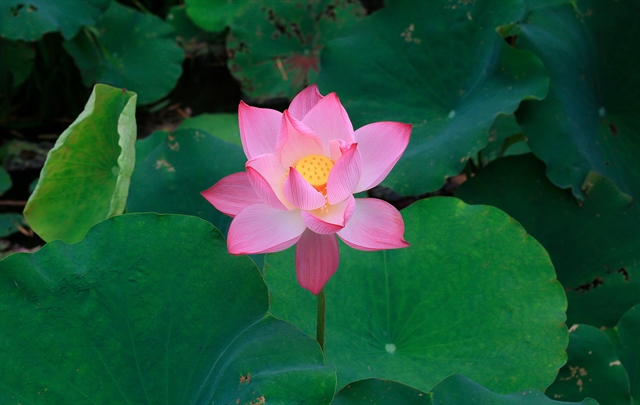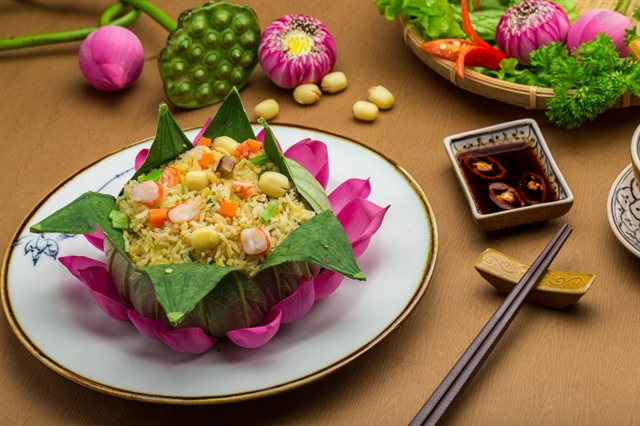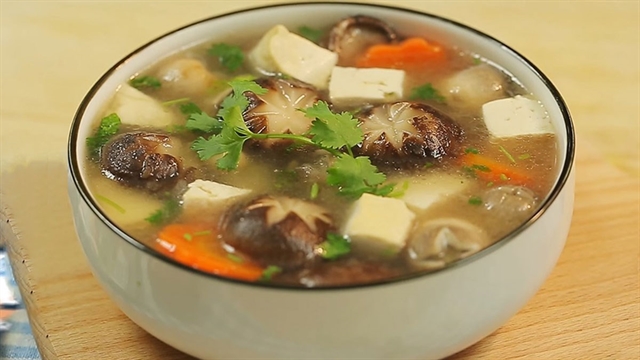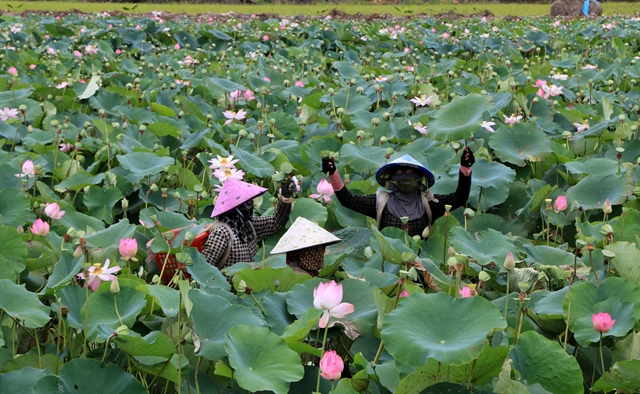Đồng Tháp Mười is the land bestowed with lotus plant. Locals have used up lotus for decorating, medicine and cuisine. Various dishes have been made from lotus, which are not only delicious but also good for health.
Thu Hiền
Đồng Tháp Mười is famed for its lotus plants, which residents use for decorating, medicine and cuisine. Various dishes have been made from lotus, which are not only delicious but also good for health.
Interestingly, all parts of the lotus plant can be used to treat diseases. Lotus root helps diarrhea, while the leaves can lower fevers.

The Đồng Tháp lotus is both beautiful and useful. — VNS Photo Trương Vị
Green core in the middle of the lotus seed can ease tension and the seed pod is high in protein.
The most popular dish is rice steamed inside lotus leaves, which was first created by locals and no one cooks it better.
All parts of lotus can be utilised for different purposes: flowers can be offered on the altar; leaves wrap food; petals scent tea; seeds make sweetened jam; stalks turn into salads, and the rhizome can be used for stewing with pork or stuffed with shrimp and pork.
Rice wrapped in lotus leaves

Fried rice wrapped in lotus leaves. — Photo amthucvietnam365.vn
Steamed rice in wrapped lotus leaves is an age-old dish which requires great care.
Local red rice (gạo huyết rồng in the local name) is often used, which offers more delicious and fragrant flavours than other genres of rice. The steamed rice should be well cooked together with lotus seeds, then poured on a tray covered with lotus leaves and left to cool.
Big green leaves are chosen, which are cleaned before being used to wrap the steamed rice. Locals add some sesame to the rice for more flavour. The whole wrap is then steamed so that all the fragrance of the leaves absorb into the rice.
The final dish has many colours; reddish rice, white lotus seeds and black sesame. The rice tastes sweet and buttery.
People can fry steamed rice together with sliced pork sausage or even seafood, lotus seeds, peas, egg and carrot before wrapping it in lotus leaves.
Lotus seed soup
This dish is quite simple to make. Ingredients include fresh lotus seeds, with the bitter green core removed, mushrooms, tofu and some carrot.

Lotus soup is thick and nutritious. — Photo nghienbep.com
Phạm Hai from Đồng Tháp notes that the lotus seeds and carrot should be well boiled in water before the mushroom and tofu are added, which is boiled for five minutes more. The soup should be served with some pepper, salt and chopped herbs.
Pork wrapped with lotus petals
Nguyễn Thanh Trang shared her recipe for making pork rolls scented with lotus fragrance.
She prepares the fillings of shrimps, pork, mushroom, fresh lotus seeds, lotus petals and one egg. All these are chopped and minced with salt. Trang advises against fish sauce.
Then, she chooses some big lotus buds to take out the petals used for wrapping the pork mixture. She explained that buds keep more fragrance than widely blooming.
She wraps the fillings in the petals before frying them in oil at low heat. She turns the rolls over to make sure the fillings are well-fried. The rolls should be dipped in a sweet and sour sauce with chilly and garlic to enhance the flavours.

Pork rolls wrapped in lotus. — Photo nghienbep.com
“The pork rolls should have a mild lotus scent with the natural sweetness of pork and shrimp, and crispy mushroom ears,” she said. “The roll should not be dry after being fried. It can be eaten with steamed rice.”
After the meal, you can make a dessert of scented lotus gruel or sip some lotus-scented tea.
“That’s a special way to enjoy the flavour of summer, a season of lotus,” Trang said.
National pride
The World Records Union (WorldKings) and the Việt Nam Records Organisation (Vietkings) has recognised the first Đồng Tháp Lotus Festival 2022 as the world's largest lotus-based dish event.
The festival featured 10 culinary experts and 50 chefs who showed off their talents in lotus dishes, making 200 dishes presented in the shape of a 10-petal blooming lotus.
Đồng Tháp Province plans to expand lotus farming, increase the value of lotus products and promote tourism based on visits to lotus fields.

A lotus pond in Đồng Tháp Province. — VNA/VNS Photo
The delta’s largest lotus-growing province plans to increase the area under the flower from the current 800ha to 1,350ha by 2025.
Local farmers grow six varieties of lotus, mostly in Tháp Mười, Cao Lãnh, Tam Nông, and Thanh Bình districts, where conditions are conducive.
Besides fresh flowers, seeds and roots, the province also produces various types of lotus-related products such as essential oil, cosmetics, wine, milk, tea and other beverages, and food.
The province, well known as the land of pink lotuses, has developed tourism products such as visiting lotus fields and foods made from the flower.
Lotus is one of the five key products in the province’s agriculture restructuring plan, as products made from the flower have been exported, providing high incomes for farmers. VNS